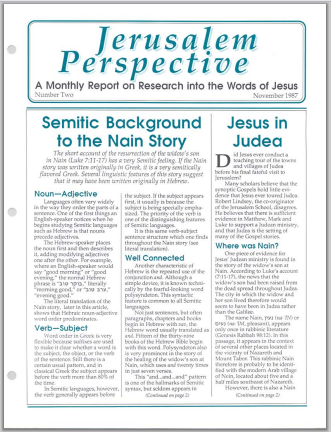The short account of the resurrection of the widow’s son in Nain (Luke 7:11-17) has a very Semitic feeling. If the Nain story was written originally in Greek, it is a very semitically flavored Greek. Several linguistic features of this story suggest that it may have been written originally in Hebrew.
Noun-Adjective
Languages often vary widely in the way they order the parts of a sentence. One of the first things an English speaker notices when he begins studying Semitic languages such as Hebrew is that nouns precede adjectives.
The Hebrew speaker places the noun first and then describes it, adding modifying adjectives one after the other. For example, where an English speaker would say “good morning” or “good evening,” the normal modern Hebrew phrase is בוקר טוב (boker tov), literally, “morning good,” or ערב טוב (erev tov), literally, “evening good.”
Note that in the Nain story Hebraic noun-adjective word order predominates: “crowd large” (vss. 11 and 12); “prophet great” (vs. 16); “word this” (vs. 17). Only once in this story does the adjective come first: “only-born son” (vs. 12).
Premium Members and Friends of JP must be signed in to view this content.
If you are not a Premium Member or Friend, please consider registering. Prices start at $5/month if paid annually, with other options for monthly and quarterly and more: Sign Up For Premium




